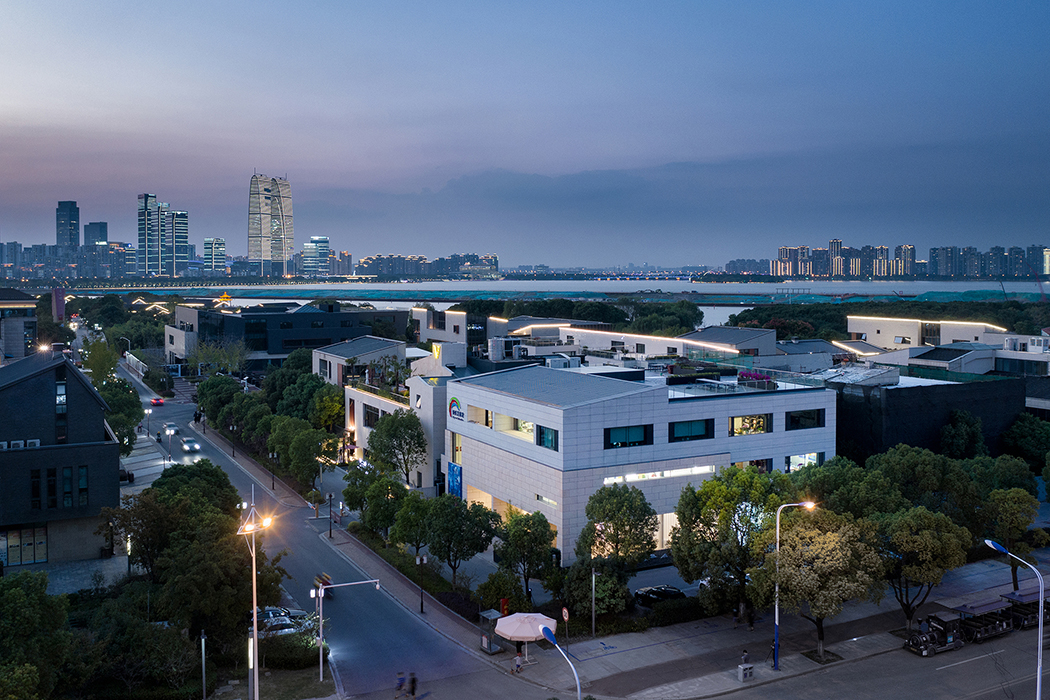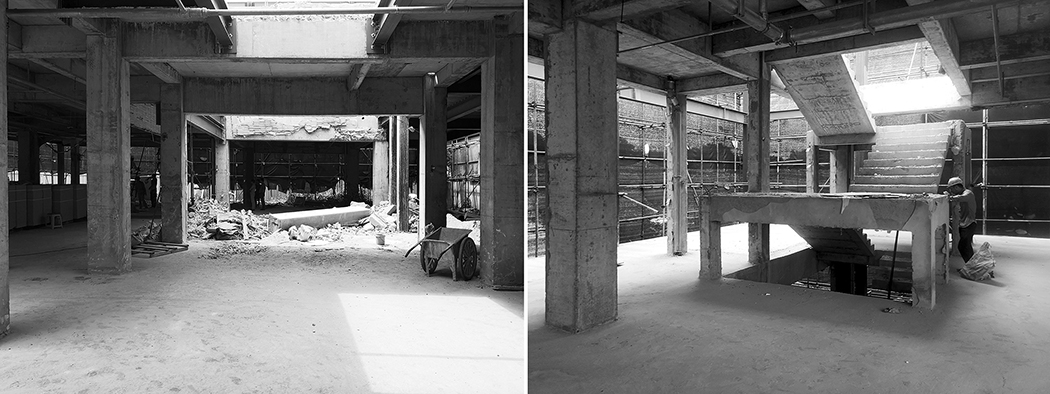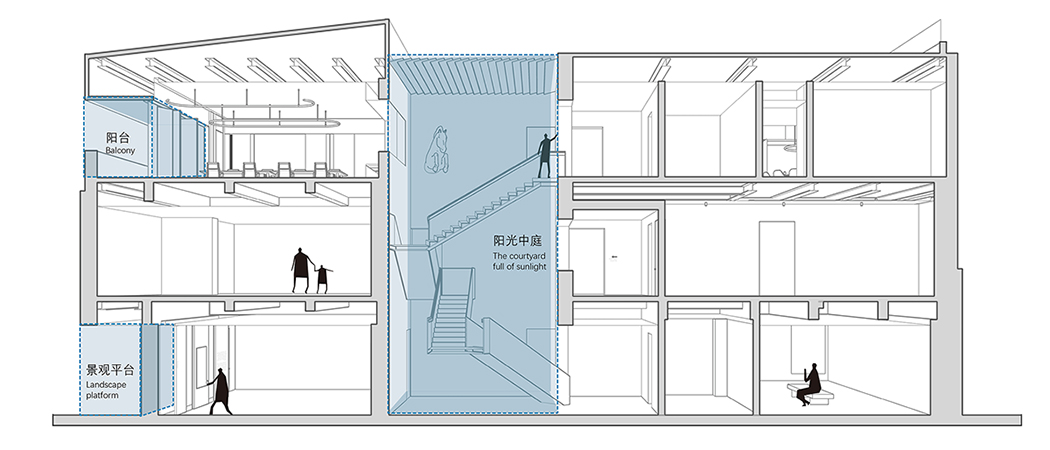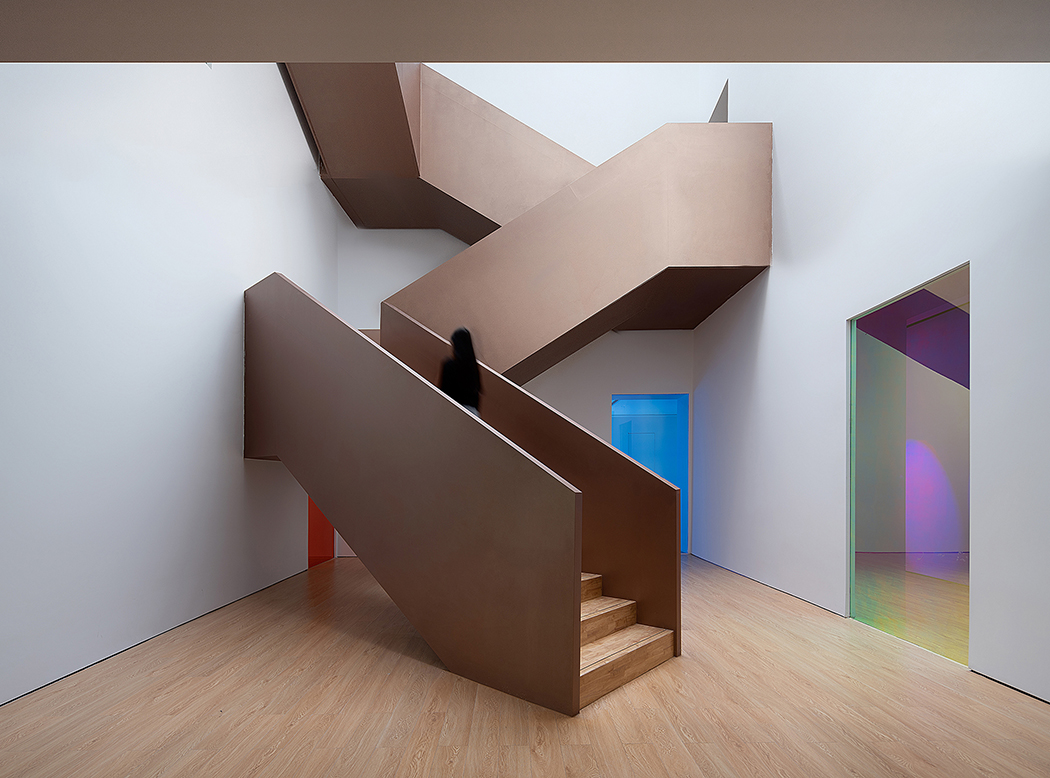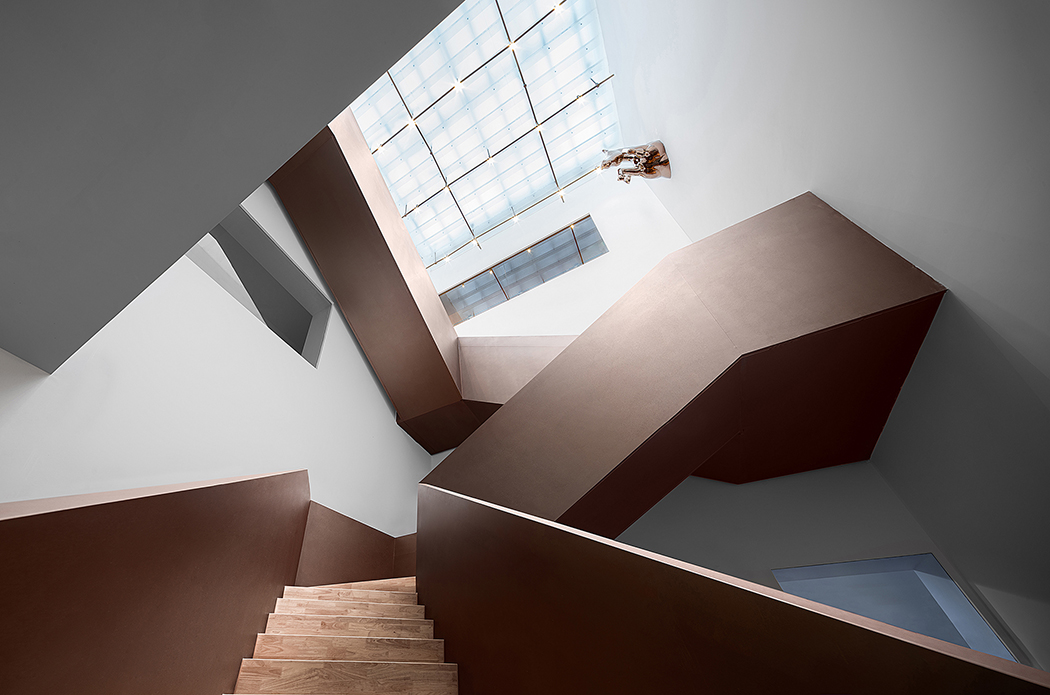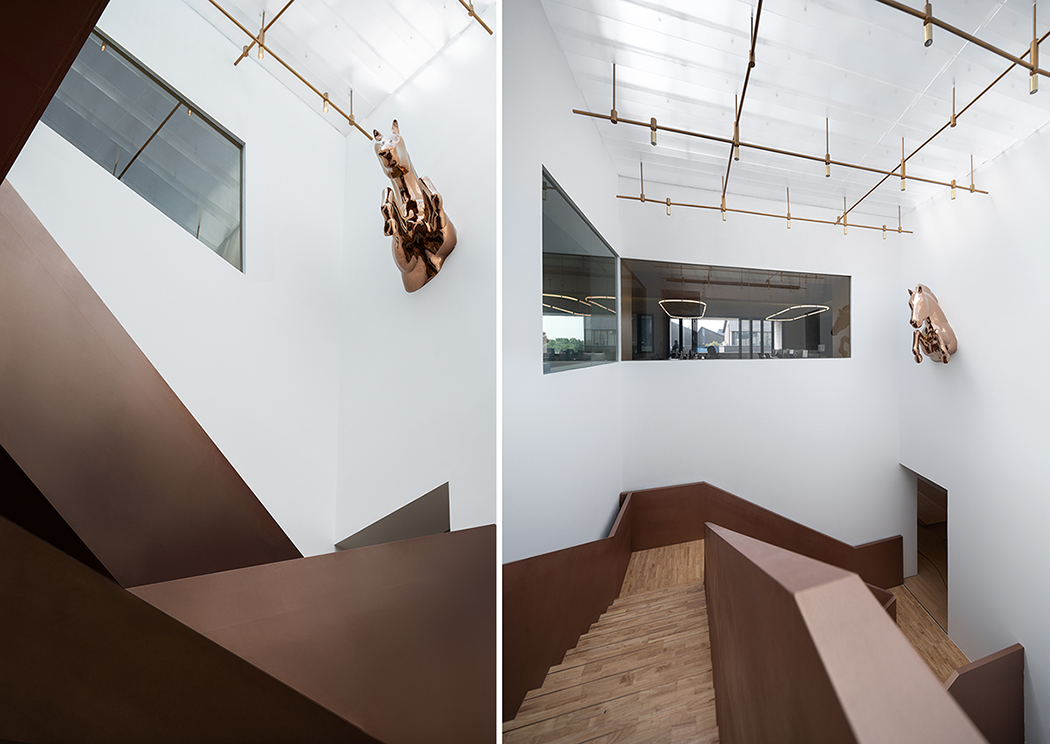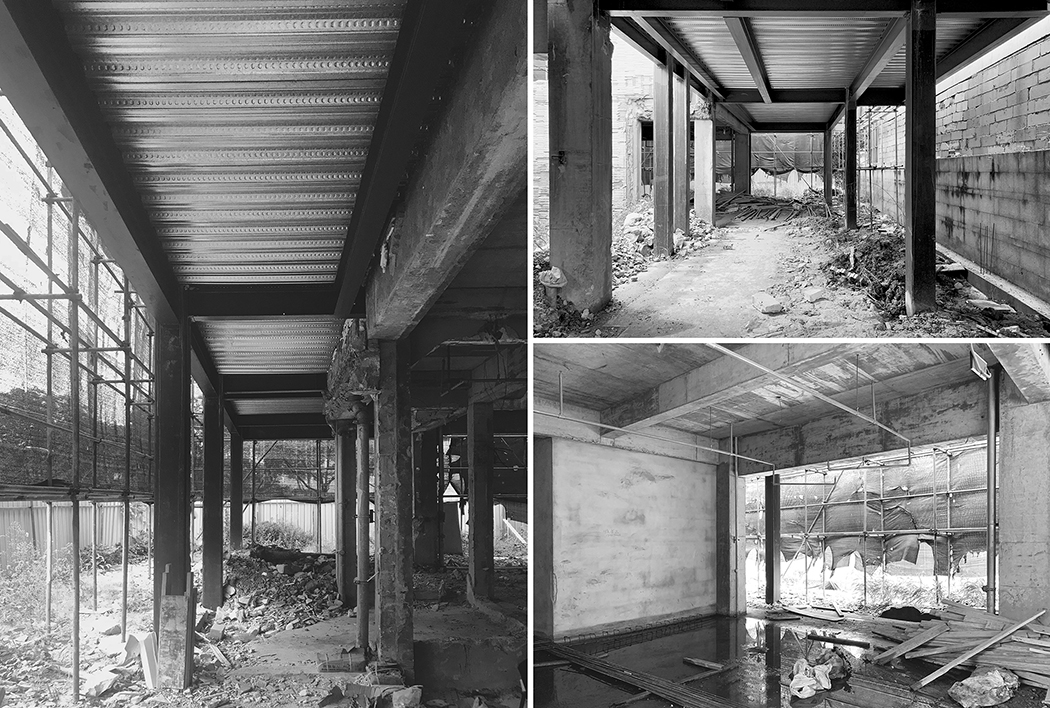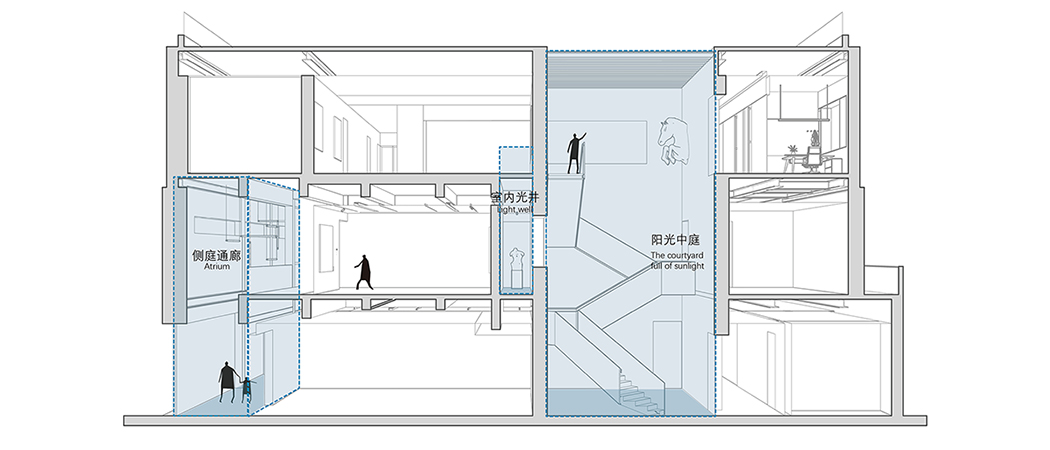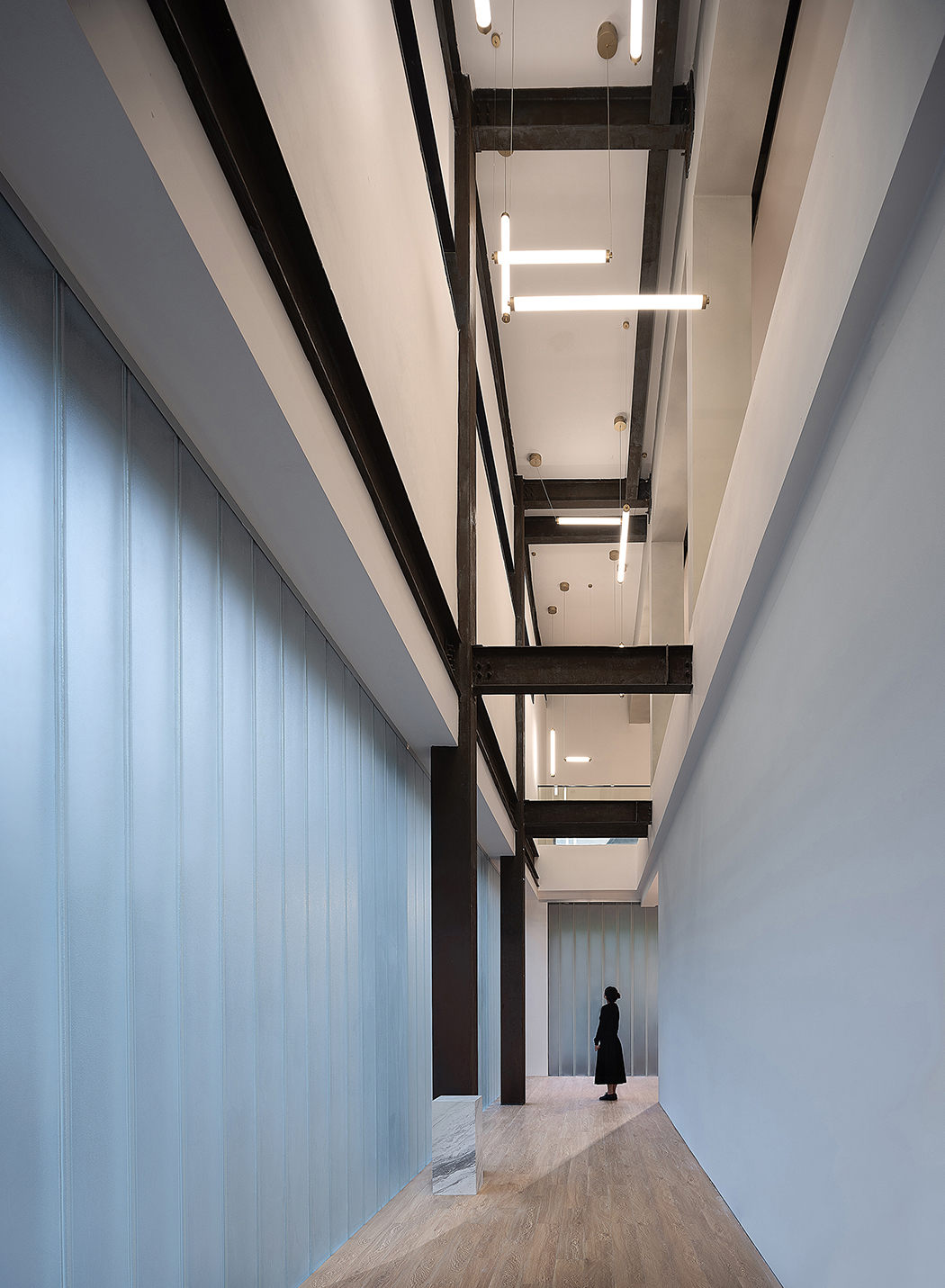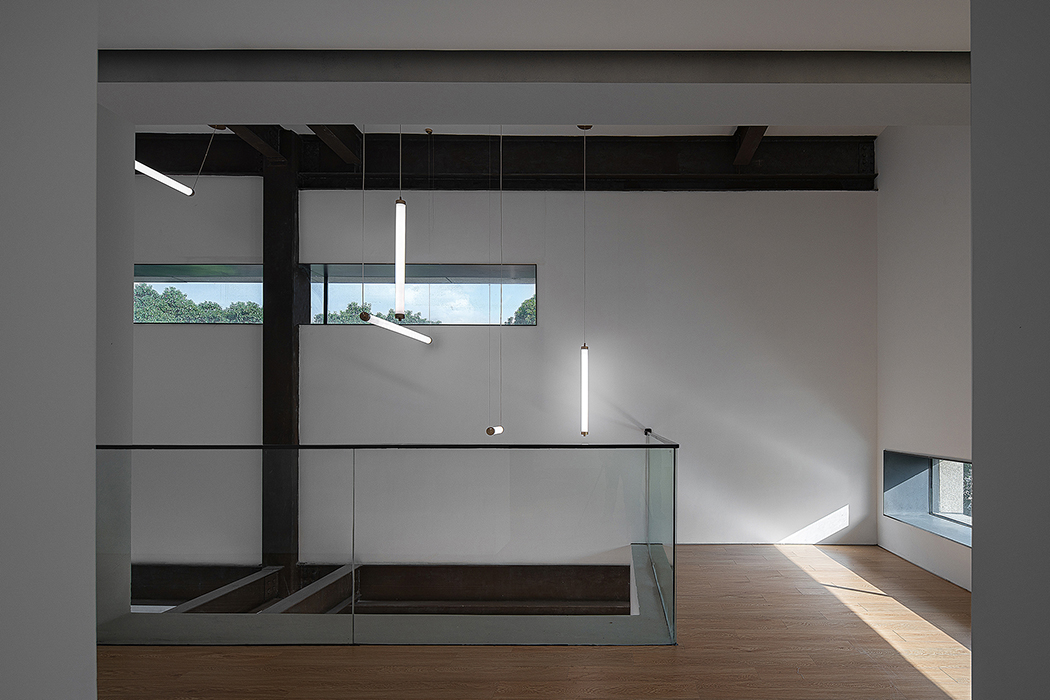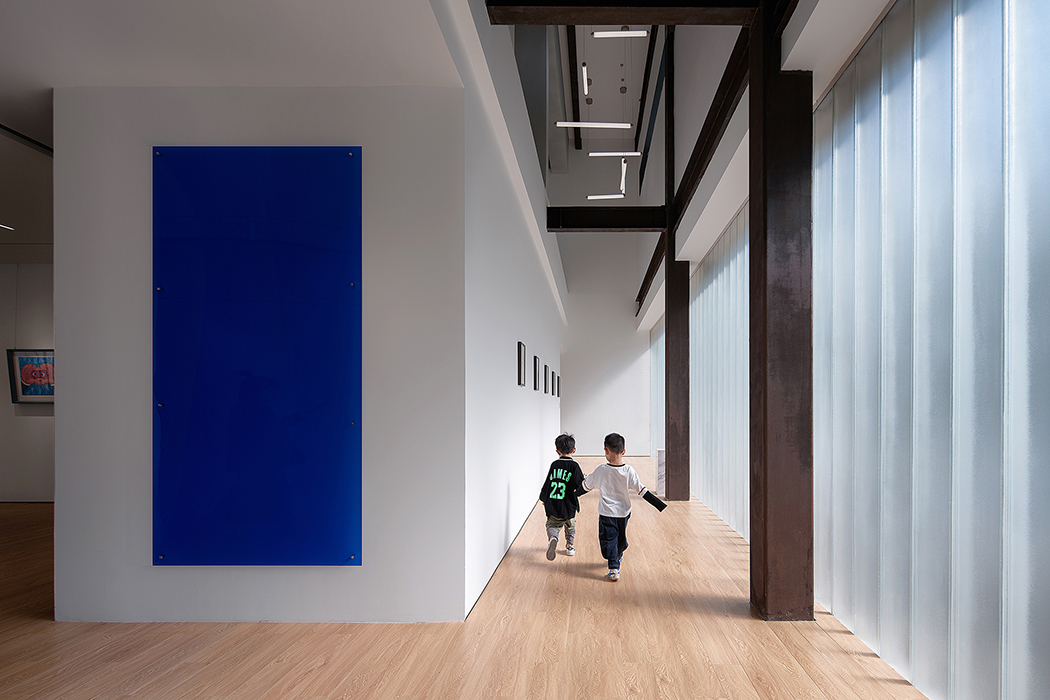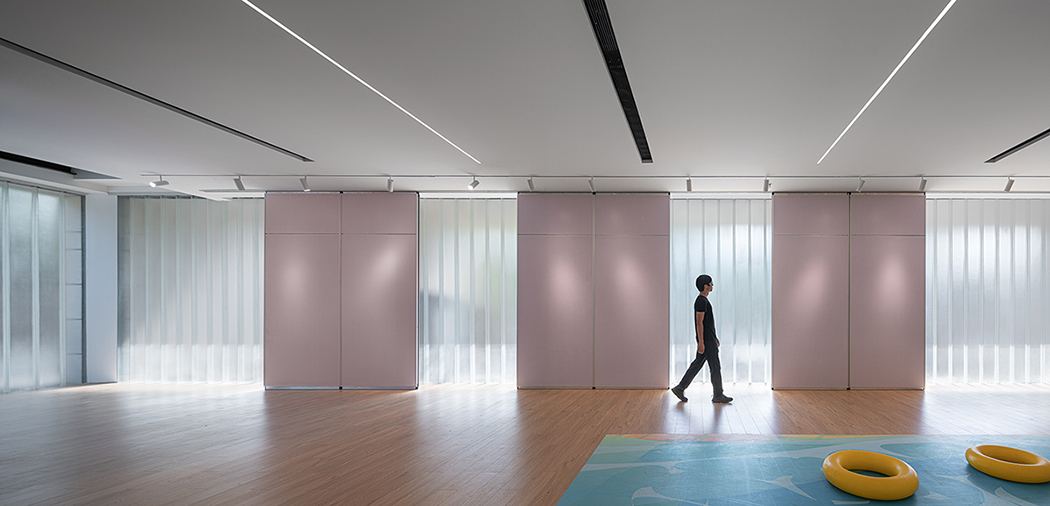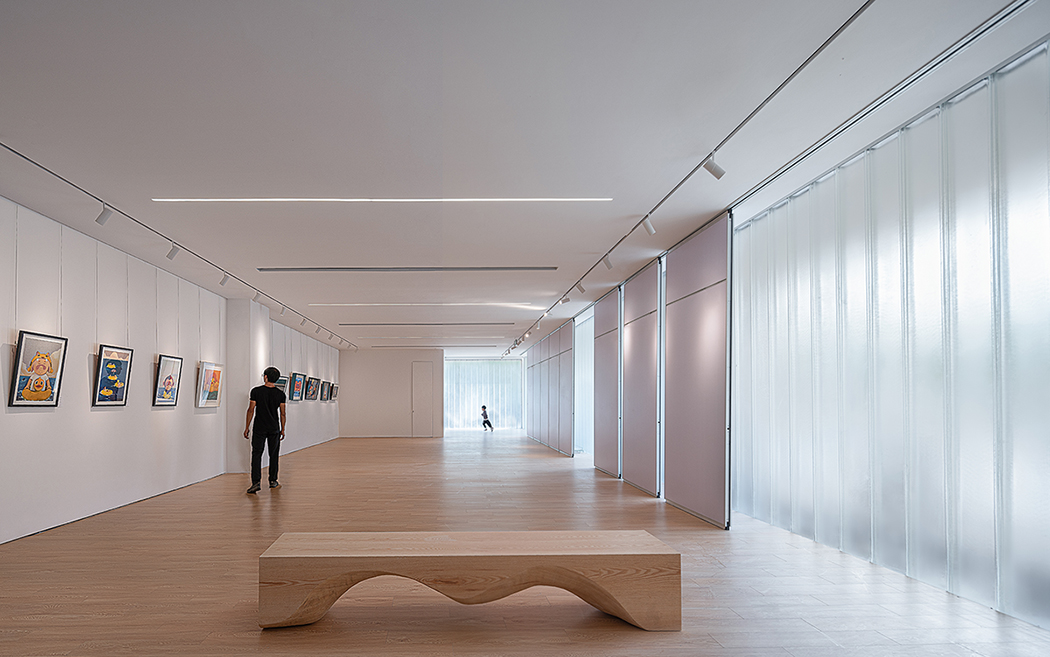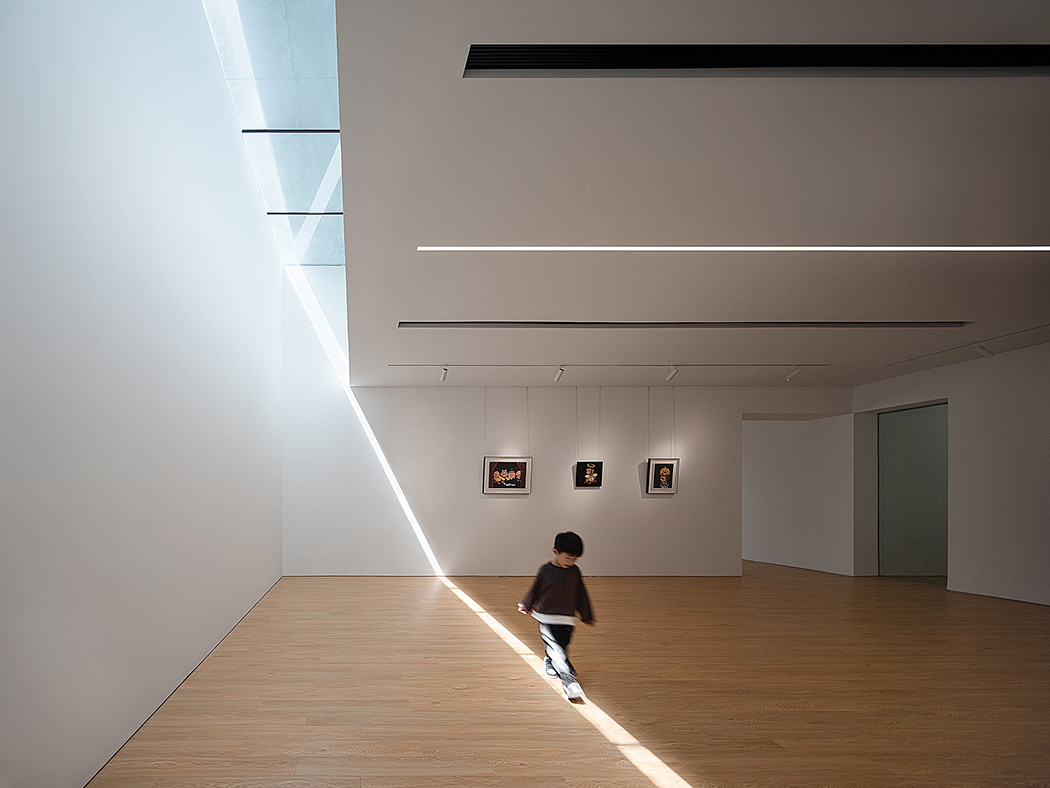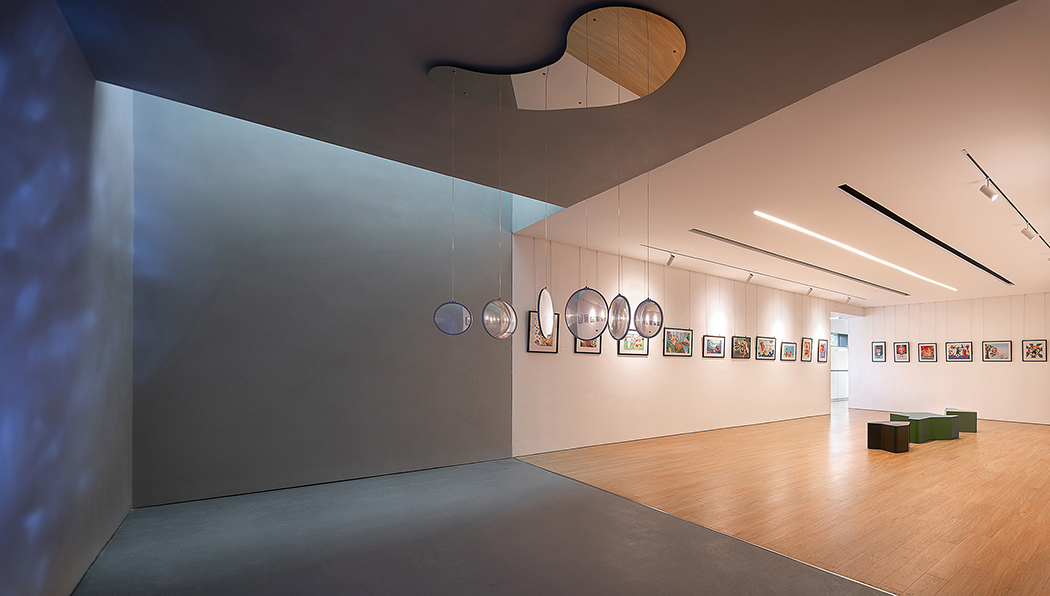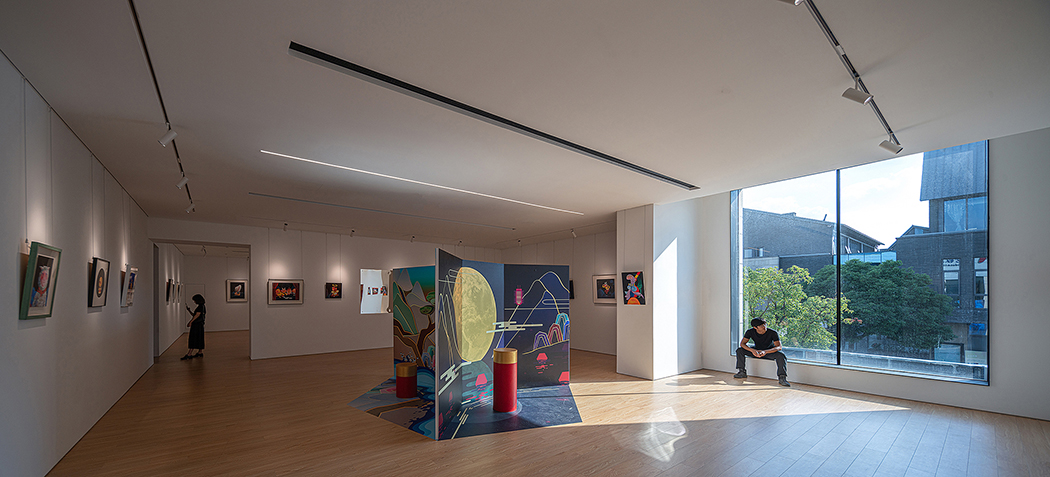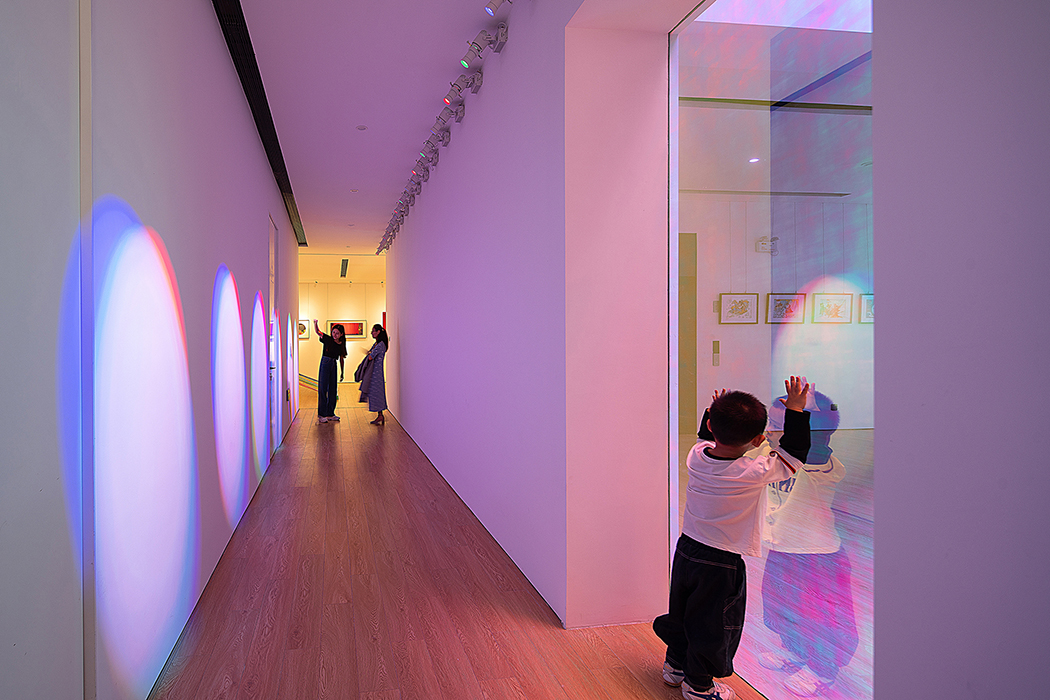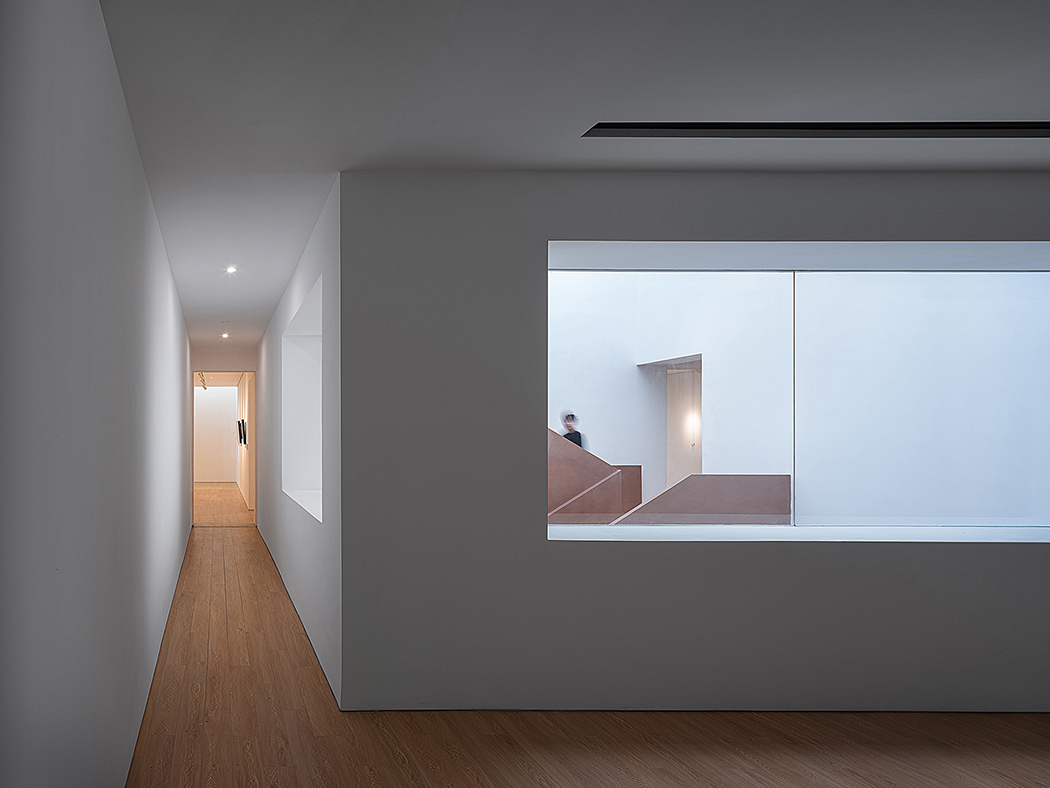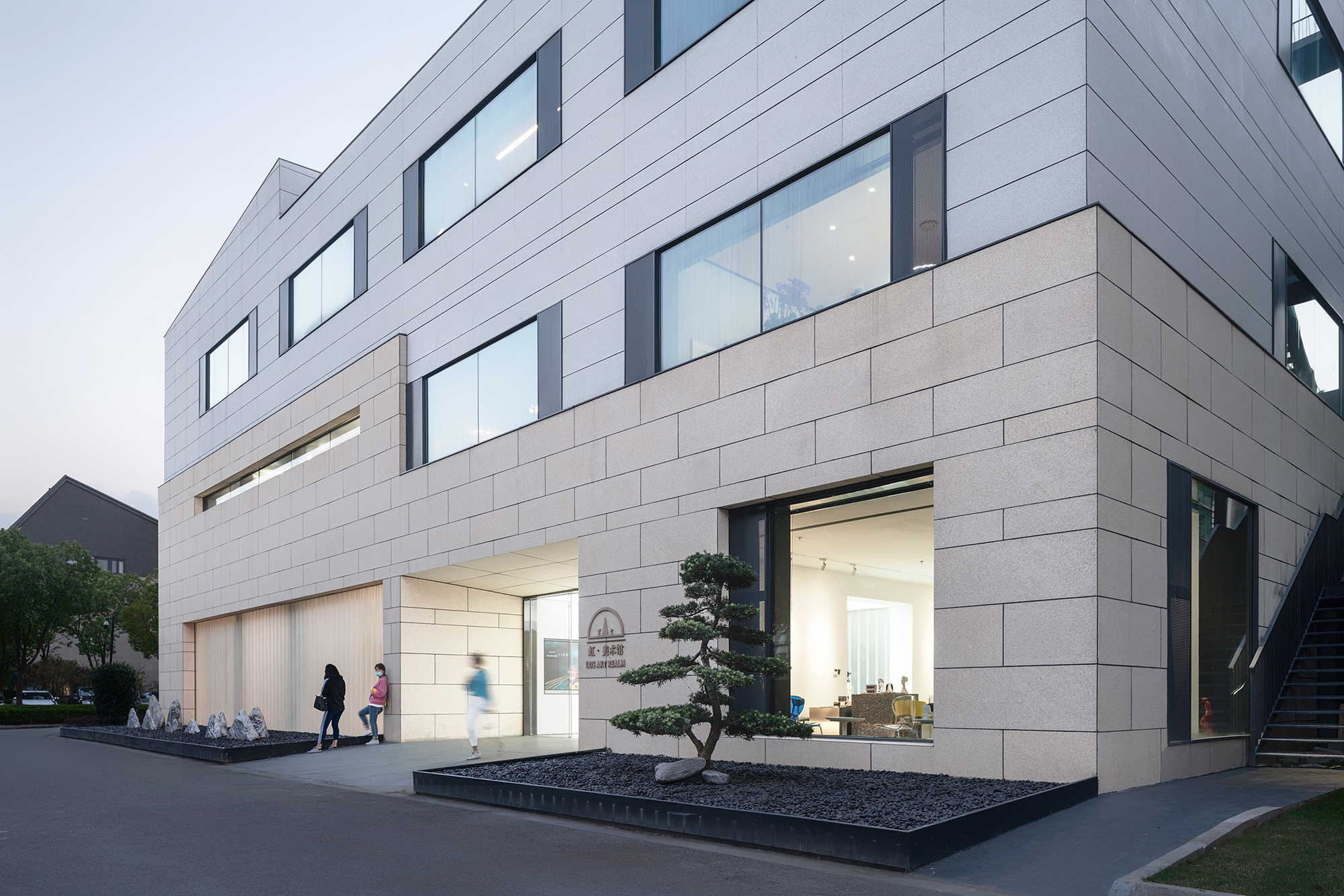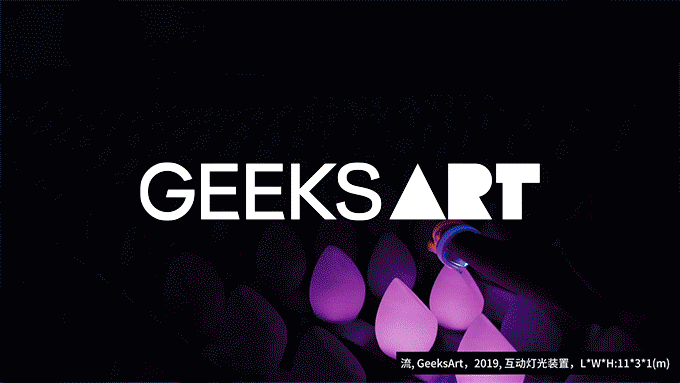虹美术馆坐落于精致典雅的苏州金鸡湖李公堤畔,是一个以儿童艺术教育与展览为主要功能的改造项目,其建筑、室内及软装由零壹城市建筑事务所一体化设计。
Iris Art Realm is located on the banks of Li Gongdi, Industrial Park Lake Suzhou. It‘s a renovation project with children’s art education and exhibition as its main function. Its architecture, interior and soft decoration all designed by LYCS Architecture.
▲城市肌理, City Texture
李公堤所在商圈是建设中的苏州CBD的核心区域,得天独厚的地理位置与历史沉淀以及多元文化的“灵魂输入”使李公堤商业街区成为苏州地区最繁华的商业街区之一。如何结合现状建筑的空间结构,对立面及室内空间进行理性的梳理和重组,给予建筑新的生命,在行色匆匆的城市为人们创造一场与艺术的奇妙遇见成为项目在设计之初就面临的最大挑战,这也是零壹城市对城市更新的进一步探索。
Li Gongdi is located in the core area of Suzhou CBD which is under construction. The unique geographical location, historical precipitation and multi-cultural “soul-input” make Li Gongdi‘s commercial district become one of the most prosperous commercial districts in Suzhou area. How to rationalize and reorganize the spatial structure, the building facade and the interior space of the current building to give it a new life, and to create a wonderful encounter with art for people become the biggest challenge from the beginning of design.
▲南面鸟瞰,South Aerial View
用“减法”形成丰富层次,实现空间重组
Using “subtraction” to form rich layers to achieve spatial reorganization
路易斯·康说「自然光给予了空间特性,也给予了建筑生命。建筑的生命由光的照射而产生。基于此,除非给予建筑生命,否则没有一个空间是真实存在的。」设计师的思考由此展开。在项目的整个设计中,可以说“光”参与了空间的创造与再组织。面对现状建筑,设计师决定保证原有建筑结构的完整性,同时适当地减去不同尺度的矩形体量以形成丰富的空间形式和层次,给光创造多尺度和多维度的引入空间,使光影与空间产生无限的可能性。
Louis Isadore Kahn said “Natural light gives the character of space, and also gives the life of architecture. The life of architecture is generated by the illumination of light. Based on this, no space can really exist unless it gives life to architecture.” The designers’ conception is thus unfolded. The whole design of the project can be said that “light” participates in the creation and re-organization of space. Facing the current situation of the building, the designers decided to ensure the integrity of the original building structure, at the same time, subtract the rectangular volume of different scales to form rich spatial forms and levels, to create multi-scale and multi-dimensional space for the introduction of light, so that shadow and space generate infinite possibilities.
▲从中庭看向展厅空间,Looking into the Exhibition Space from the Atrium
激活各个空间的阳光中庭
Activate sunlight atriums in each space
现状建筑的结构较为方正,因而建筑面宽和进深的尺度过大,已有中庭的尺度无法满足室内空间的采光需求。设计师将原本的中庭扩大,各功能空间围绕中庭展开布置,顶部的U玻设计保证光线的充足引入。横跨三层的步行楼梯被置入其中,成为整个美术馆空间流动的灵魂。它将所有空间连接激活,同时也是美术馆内最为震撼的室内装置艺术。
The current structure of the building is relatively rectangular, so the width and depth of the building are too large, and the scale of the existing atrium cannot meet the lighting needs of the inner space. This design expands the original atrium and arrange all functional spaces around it. U-glass is used as the roof material to ensure the sufficient introduction of light. A pedestrian staircase spanning three floors is inserted into the space and becomes the flowing soul of the entire gallery space. It connects and activates all the spaces, and is also the most impressive indoor installation art in the museum.
▲改造前,Before
▲剖面透视图,Sectional Perspective?LYCS Architecture
▲横跨三层的大楼梯 , The Large Staircase Spanning Three Floors
▲大楼梯将所有空间激活,The Grand Staircase Activates all Spaces
中庭顶部的玻璃有序排列,阳光透过天窗温柔地洒落,在洁白的墙面上自然形成明暗交替的斑驳光影。窗洞的设计运用极简线条的设计语言,将被U玻天窗过滤一遍的稳定光线引入各个室内空间,由此产生静谧的氛围带给人们天马行空的思维导向,引发无限遐想。
The glass on top of the atrium is arranged in an orderly manner. The sunlight falls gently through the skylight, forming mottled light and shadow on the white walls. The window frame uses the minimalist design language. The stable light filtered by the U-glass skylight is introduced into each interior space, therefore, the atmosphere of tranquility is created, bring people the guidance of unrestrained thinking and triggers infinite reverie.
▲顶部天窗给中庭带来充足阳光, The Skylight at theTop Brings Plenty of Sunlight to the Atrium
▲从三层俯瞰中庭, Overlooking the Atrium from the Third Floor
内外之间缓冲的侧庭通廊
Internal and external buffer
设计将建筑南侧一层、二层的侧庭打通,为内部封闭展厅与外部光线之间提供了空间流动界面。同时,立面大面积的半透U玻取代实墙模糊了室内外边界,使侧庭空间成为室内外之间的缓冲与过度,置身其中可以意识和感知到室外空间的存在。侧厅的设计运用极简的建筑语言,所有多余的装饰都被摒弃。直白裸露的钢架结构与最原始的建筑材料还原了结构本身的美。U玻材质与高窗的运用避免了日光对展厅空间的直射,光线被选择性的接受、阻挡和弱化。
The atrium on the south side of the building is selected for a double height design, providing a space flow interface between the enclosed exhibition hall and the external light. Meanwhile, the semi-permeable U-glass replaces the solid wall in the facade, blurring the boundary between inside and outside, making the atrium space become the buffer and transition between interior and exterior, in which the existence of outdoor space can be realized and sensed. The design of the atrium replaces superfluous decorations with a minimalist architectural language. The bare steel frame structure and the most original building materials restore the beauty of the structure itself. U-glass materials and high windows are used to avoid direct sunlight to the exhibition space, and the light is selectively accepted, blocked or weakened.
▲改造前,Before
▲剖面透视图,Sectional Perspective?LYCS Architecture
▲侧庭通廊,Atrium
▲侧庭过道,The Corridor of Atrium
▲从展厅看向侧庭,Looking at the Atrium out of the Exhibition Hall
紧邻侧庭的展厅,由实墙围合形成近乎封闭式的空间,仅留一个门洞引入透过U玻的自然日光。经过双层过滤后的光线已经十分微弱。一墙之隔却泾渭分明的明暗对立空间,置身其中,仿佛通过时空转换的隧道,给人以恍惚的穿越感。而关于幻境与现实的思绪在人们心中妙不可言的发生,也淬炼出人们内心深处的思考与安宁。
The exhibition hall, adjacent to the side atrium, is surrounded by solid walls to form a nearly enclosed space. Only one door opening to introduce the natural daylight that first passes through the U-glass. The light is really faint after being filtered through a double layer glass. The space with strong contrast between bright and dark is only separated by a wall, in which people seem to pass through the tunnel of spatial-temporal transformation, and have a feeling of trance through space-time corridor. The wonderful occurrence of thoughts about fantasy and reality in people‘s mind has also tempered people’s deep thinking and peace.
▲泾渭分明的明暗空间,Distinct Light and Dark Space
用光营造多元的展厅空间
Creating a diverse exhibition space by using light
与传统的美术馆不同,儿童艺术展示的空间对于环境和光照的要求相对更为宽松和灵活,其展陈形式也更为多样化。设计基于现场原有建筑的条件与周边建筑和景观的环境,通过光线的变化,营造了四类空间感受迥异的展厅。
Different from traditional art galleries, the requirements on environment and light of children‘s art exhibition space is more relaxed and flexible, and its exhibition forms are more diversified. Based on the conditions of the landscape environment, existing and surrounding buildings on site, the design creates four categories of exhibition halls with different spatial feelings through the changes of light.
▲剖面透视图,Sectional Perspective
建筑内外空间的柔和交织
The soft interweaving of interior and exterior spaces
南侧建筑的凹入空间昭示建筑主入口。简约的线条与灰白主色调是室内空间重要的设计元素。入口与中庭之间的隔段用 U玻替代了实墙,通透了空间并延伸了视线,竖向线条恰到好处的起到视觉分隔与时空交织的效果。
A recessed space on the south side of the building indicates the main entrance. Simple lines and grey and white tones are important design elements of the interior space. The partition between the entrance and the atrium is made of U-glass instead of solid wall, which penetrates the space and extends the line of sight. The vertical lines perfectly play the effect of visual separation and spatial-temporal interweaving.
▲主入口门厅,Main Entrance
建筑西侧切割了三个相等的矩形体量,形成了室外景观平台序列。整片石墙被U玻取代,光线的强渗透性被过滤并透射到室内,整个展厅空间仿佛沉浸在一片温柔中。室外的景观与室内人们的视线被潜移默化的连接,内外的空间界限在视觉上变得模糊而柔和。
Three equal rectangular volumes are subtracted from the west side of the building to form a sequence of outdoor landscape platforms. The whole stone wall is replaced by U-glass, and the strong permeability of light is filtered and transmitted to the interior. The whole exhibition space seems to be immersed in a gentle atmosphere. The outdoor landscape is subtly connected with the people’s sight inside, and the boundary between the interior and exterior space visually becomes blurred and soft.
▲透过U玻引入漫反射光的展厅空间,Exhibition Space with Diffuse Light Introduced through U-Glass
来自上空的一线之光
A ray of light from above
二层西侧的半通高侧庭使光线经过天窗渗透到室内,产生的光影与纯白墙面形成强烈的对比,仿佛在展厅内置入了一个流动的“光体块”。时间的变化为光影带来无限可能,打破了空间的定格,为空间创造了深度。当人们置身展厅在艺术品前或省思或交流的时候,光线似乎与时光一起始料不及的流过。
The half-way high side atrium, on the west side of the second floor, allows the light to penetrate into the interior through the skylight, creating a strong contrast between the light and shadow generated and the pure white wall, as if a flowing “light volume” was placed in the exhibition hall. The change of time brings infinite possibilities to light and shadow, breaks the freeze of space, and creates depth for space. When you are in the gallery reflecting or communicating in front of art, light seems to flow unexpectedly with time.
▲透过天窗引入漫反射光的展厅空间,Exhibition Space with Diffuse Light Introduced through the Skylight
室内光井将公共空间向上延伸,洒落的光线与室内灯光不期而遇。光线的丰富层次为空间增添几分灵动与张扬。设计用素混凝土和白色涂料两种简单却反差极大的材料,给展厅空间与公共交通空间创造了视觉边界。
Interior light well extends upward the public space, and the falling light and the interior light meet by chance. The rich level of the light makes the space dynamic. Two simple but contrasting materials, plain concrete and white paint, create a visual boundary between the exhibition space and the public transport space.
▲室内光井,Interior Light Well
展厅内的驻足远眺
The view from the exhibition hall
为了能够观展的过程中适度的引入人与外部自然之间的视线连接,也充分的呼应美术馆所在的李公堤的自然景观,设计在部分展厅内置入落地玻璃将更多的自然光线引入展厅空间。大面积的实墙遮挡使光源的强渗透性得以收敛。窗框规范了光落地的范围并将人引导至此驻足停留、嬉戏玩耍。
In order to appropriately introduce the line of sight between people and the external nature in the process of viewing the exhibition, and fully echo the natural landscape of Li Gongdi where the Iris Art Realm is located, glass curtain wall is used in some exhibition halls to introduce more natural light into the interior space. The strong permeability of the light source is weakened by a large area of walls. The window frame standardizes the scope of light falling to the ground and leads people to stop, stay and play.
▲一层东侧展厅,The Exhibition Hall on the East Side of the First Floor(gif)
▲二层西侧展厅,The Exhibition Hall on the West Side of the Second Floor
边走边看的过道
Walking and looking in the corridor
作为美术馆次要空间的过道,设计师并没有过多地做隐蔽处理,而是将其打造为展厅的延续。交通空间围绕中庭展开布置,投影灯在过道白墙上映射出的绚烂光影,让人在不经意间已互动其中。过道串联起各个展厅空间,它保证了人们在观展过程中的连续性体验。
Corridors as the secondary space of the gallery, the designers do not do too much concealment, but make it a continuation of the exhibition hall. Walkways are arranged around the atrium. The brilliant light and shadow of the projection lamp on the white walls make people interact with it inadvertently. The corridors connect each exhibition space, which ensures people‘s continuous experience during the viewing process.
▲投影灯打造的彩虹过道,The Rainbow Aisle Made of Projection Lights
▲从二层过道看向中庭, Looking at the Atrium Out of the Second Floor
作为室内空间表征的建筑立面改造
The reconstruction of building facade is the representation of interior space
立面的改造以对应室内的空间功能为契机,通过不同形式与尺度的开窗形式来避免光线直射展厅空间,将光线自然过渡到室内,来均衡室内光影的强弱关系,满足不同的功能空间对于光的需求,并让光线与空间在不断交织中产生变化。
The transformation of facade is based on the function of interior space. Different forms and scales of windows are adopted to avoid direct light in the exhibition space, and the light is naturally transferred to the interior to balance the relationship between indoor light and shadow. The transformation of the facade satisfies the needs of different functional spaces for light, and changes the light and space in the continuous interweaving.
▲改造前,Before
▲街道视角,Street View
建筑立面采用两种不同颜色的石材进行拼接形成界面构成感,强化外立面与室内功能空间的对应关系。不同尺度和形式的开窗在立面上形成独特的节奏感,玻璃与石材结合形成强烈的虚实对比,大面积的半透明U玻通透了室内外空间。
The building facade adopts two different colors of stones join together to form a sense of interface composition, which strengthens the corresponding relationship between the exterior facade and the interior functional space. Windows of different sizes and forms create a unique sense of rhythm on the facade. The combination of glass and stone forms a strong contrast between virtual and real, and a large area of translucent U-glass penetrates the indoor and outdoor spaces.
▲主入口界面,Main Entrance
▲U玻与墙面石材的融合,The Fusion of U-glass and Wall Stone
项目信息——
项目名称: 苏州虹美术馆
项目业主:苏州新虹艺教育集团
项目地点: 中国 | 苏州
建筑面积: 2000平方米
项目时间: 2019年-2020年(设计+施工)
设计公司: 零壹城市建筑事务所(建筑设计、室内设计、景观设计、软装设计)
设计团队: 阮昊、詹远、张磊、张秋艳、劳哲东、赵一凡、柯安然
摄影师:吴清山
影片:吴清山
Project Information——
Project name: Suzhou Iris Art Realm
Client :Suzhou Skyroad Education Group
Location: Suzhou, China
Size: 2,000 sqm
Project Period: 2019-2020(Design+Construction)
Design Firm : LYCS Architecture (Architecture, Interior, Landscape and Soft Decoration)
Project Team: RUAN Hao, ZHAN Yuan, ZHANG Lei, ZHANG Qiuyan,LAO Zhedong, ZHAO Yifan, KE Anran
Photographer: WU Qingshan
Video:WU Qingshan



